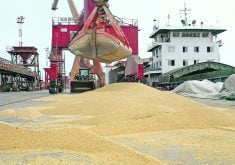The ink is still drying on the contracts, but most crop marketing advisers think the Canadian grain industry’s spring wheat, durum and barley contracts look OK.
However, farmers will see months of tweaking before it’s clear how most of the Prairies’ cereal crops will be contracted.
“We’ve been doing some new crop wheat and winter wheat contracts,” said grain broker Allan Johnston of Welwyn, Sask., who was at the Crop Production Show in Saskatoon Jan. 9 talking to farmers and buyers.
“There are so many things happening that it’ll take weeks to get it all in order,” he said. “It was 60 years the other way, so it’ll take a while to get the new system in place.”
Read Also

Flax sector sees omega-3 opportunity
SASKATOON — A global shortage of omega-3 oils could be an opportunity for the flax sector, says an industry official….
Barring court action, prairie farmers will sell their spring wheat, durum and barley in an open market starting Aug. 1.
Almost no contracting for 2012-13 wheat board crops was done before the federal legislation that eliminated the CWB’s single desk powers was proclaimed in mid-December.
Viterra announced contracts the day after and other buyers followed suit.
Most offer a set price at a specific delivery location in a specific period, with few other options available.
“We haven’t seen any basis contracts yet,” said Darren Frank of FarmLink Marketing Solutions.
“For the most part, they’re flat-priced. Everybody’s probably waiting for the ICE contracts to come out.”
The ICE Canada futures contracts for spring wheat, durum and barley will begin trading at 7 p.m. Jan. 22, which is the beginning of the European Jan. 23 trading day, said ICE Canada chief executive officer Brad Vannan.
“Everything’s progressing very well,” said Vannan.
Charlie Pearson of Alberta Agriculture said farmers need to understand the new contracts before they sign them.
“Know what’s in there, so you don’t have any surprises,” Pearson said.
Spring wheat, durum and barley are new to contracting on the Prairies and may be subject to different conditions than the crops that farmers are more familiar contracting.
Cereals tend to have a far wider spectrum of types, qualities and grades than other crops, so the contracts might be more complex.
Frank said farmers should try to set up their contracts to suit the crop they’re likely to produce rather than re-engineering a contract once the crop is in the bin and finding it doesn’t meet the specifications.
“If four out of five years you produce a two (grade), it doesn’t make much sense to sign a contract for a one without knowing how the two will be treated,” said Frank.
“Get that discount in there and negotiate the premium later (if you get lucky and get a number one).”
Vomitoxin levels and protein premiums are also factors to consider.
Advisers say companies might not be willing to be pinned down on exact premiums and discounts before harvest, but they can be pressed to explain how they are likely to treat crops that don’t meet the contract specifications.















